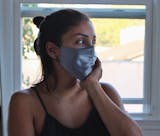You’ve been planning that trip to Hawaii for months. It’s finally summer, and it’s time to go! You plan to walk on the gorgeous beaches, soak in the warm sun, and explore the beautiful coral reefs during day, and check out the local nightlife scene and try out some local delicacies when the sun’s down.
It sounds like a great vacation all-round, but there’s one problem. Hawaii’s coral reefs, which house over 7,000 plant and animal species, are dying. And you’ve probably guessed why from the title of this blog – the culprit is none other than your skin-friendly, sun-reflecting sunscreen.
Let’s take a deep dive into this subject, and look at some eco beauty companies that sell reef-friendly sunscreen.
How does sunscreen damage our coral reefs?
Every year, as people throng to beaches, over 14,000 tons of sunscreen is washed into our oceans. Most of this happens directly, as people go swimming with sunscreen on, but you also wash off sunscreen when you shower, and it finds its way down your drain and into our water supply. A fair quantity of this sunscreen contains chemicals such as oxybenzone and octinoxate, which cause an incredible amount of damage. Oxybenzone is the key culprit, and it’s found in thousands of sun care products.
How do these chemicals damage our coral reefs? For starters, they cause bleaching, which takes away from their appearance. Our coral reefs are gorgeous and vibrantly colored, and bleaching is a major problem. Secondly, they damage the DNA of corals, which causes problems with reproduction. Finally, these chemicals lead to deformities and abnormal growth – again affecting not only the health but also the appearance of our once-beautiful coral.
Some areas are worse affected by this problem, because the severity of this issue is determined by the number of tourists who visit a place, and unregulated use of sunscreen that contains harmful ingredients. Over half the coral reefs in Hawaii’s Big Island are damaged, and 44% of the coral on Maui’s west coast is in a bad state.
Oxybenzone isn’t just bad because of how harmful it is, it’s also bad because of how effective it is at causing damage. Researchers have found that very low doses of the chemical can cause damage – as little as a single drop in 6.5 Olympic swimming pools worth of water!
Many people aren’t aware of the fact that coral reefs aren’t just a pretty structure – they serve as an ecosystem, and are a habitat for many rare and magnificent species. You can think of coral as beautiful submerged gardens – colorful, vibrant, and harboring numerous lifeforms. That is part of why it’s so important to protect them.
In the last 50 years, over 80% of the coral in the Caribbean has become damaged – owing to pollution, development, climate change, and other factors.
So, that’s the problem we’re looking at. Now let’s consider the solution.
What can you do to help?
Hawaii became the first US state to ban the sale and distribution of sunscreen containing oxybenzone and octinoxate in 2018. However, there’s still a lot to be done, because people can bring sunscreen with them, and the products they bring in may contain these harmful chemicals. Here’s how you can help the world’s coral reefs:
Use reef-friendly sunscreen
Most eco beauty companies sell sunscreen that doesn’t contain harmful chemicals, so you can take a dip in our oceans without worrying about damaging coral ecosystems. If you’re looking for product recommendations, skip to the last section!
If you want to do some research before you purchase a product, look out for a label that says “coral friendly” or something to that effect, and go through the ingredients list looking for the chemicals we mentioned earlier. If the company follows green policies (like our favorites do), that’s a double win for the environment!
Use clothes instead of sunscreen
If you want to enjoy the view and soak in the sun, you can do both without using sunscreen at all! Wear long-sleeved shirts, trousers and a hat, and you’re good to go! You can even go swimming, if you wear something like a button-down shirt and carry a towel. You won’t be able to tan, however.
The best thing about wearing full clothes instead of using sunscreen is that it’s better for your wallet! Clothes are reusable and will last much, much longer than a bottle of sunscreen – without causing any environmental issues (unless the clothes contain plastic).
Avoid using spray-on sunscreen
Sunscreen that you can just spray on is a lot less time consuming, but aerosol cans are generally not good for the environment. And a large number of spray-on sun protection products contain harmful chemicals.
Plus, when you spray the product onto your skin, a lot of overspray ends up on the sand, and washes into the water with the high tide. Go the old-fashioned route and use traditional sunscreen. It doesn’t take very long to apply, and it’ll provide slightly better coverage.
Sit in the shade
You can pick a shady spot to sit, or you can bring a tent or an umbrella with you, so you can watch the beautiful sea without polluting it. If you’re going during the summer this is an excellent idea, because the sun can get pretty hot!
Sitting in the shade has a couple other benefits too. You don’t have to buy sunscreen, which is a big one. Next, you can play games, read a book, and enjoy your food and drinks – none of which feels very good in the sun. Lastly, if you have dry skin, you’ll appreciate the shade, since the sun won’t dry out your skin!
Visit an eco-friendly resort
Certain resorts, like Aqua-Aston (in Hawaii) provide reef-friendly sunscreen and other goodies in little “eco kits”. So instead of having to research and buy eco beauty products, you can depend on the resort to provide them to you.
We don’t recommend this because it won’t help you in the long-term, but if you just need something simple and easy that helps the coral reefs, you can try this out. And of course, check out the products we mention in the last section!
Use eco-friendly sunscreen
If your sunscreen doesn’t damage our coral reefs but comes in a non-recyclable container and has toxic chemicals in it, you’re back to square one. So, don’t just look out for reef-friendly sunscreen. When purchasing a product, also make sure it’s Earth friendly. And then do your part! If your sunscreen runs out while you’re vacationing, make sure you still recycle – even if that means bringing the empty bottle back home.
Not using eco-friendly sunscreen may not harm our coral, but it will still create environmental problems for the place you visit. So, avoid nullifying your efforts by ensuring the product you purchase is eco-friendly and ethical.
Tell people about it
This is a problem that many people are still unaware of, so now that you know about it, spread the word by sharing this article with your friends and family! Or you can just talk to them about it when you meet them. It’s a great way to avoid political discussions over dinner.
These were some of the best tips we could find, but there may be other ways to avoid contributing to this problem. Just make sure you’re looking out for yourself and the environment!
Eco beauty companies with reef-friendly sunscreen
You’ve worked hard on that perfect beach body, and covering it up with clothes and giving up on the opportunity to get a tan can’t be very appealing. So for those of you who need to use sunscreen but aren’t sure where to look, here are two of our favorite products – both of which serve two purposes at the same time!
Earthwise Beauty has an interesting take on sunscreen. Instead of selling the traditional lotion-like product, they sell a Sun Reflector that comes in powder form. Not only does this make the product waterless, but it means that there’s no filler material, so you’re getting a more concentrated product which’ll last longer. Using it is simple – just mix a pinch of the powder to your favorite facial oil, and apply it to your skin.
This product doesn’t contain nano particles, and it has uncoated zinc oxide, which protects you from the sun without causing any damage to our environment. And of course, since you’re using it with facial oil, you’ll get two benefits at once!
The second product we recommend is the Malu Day Cream (SPF 30) by Honua. It protects your skin from the sun, and from the environment. It smells wonderful, feels luxurious and creamy, and comes in an easy-to-use pump bottle. The product is palm oil free, cruelty-free, and sustainable. A percentage of the proceeds goes towards supporting nonprofit organizations that are working on keeping our oceans clean.
Once you purchase a product that feels right to you, check out our blog on how to properly apply sunscreen.
Of course, since we’re Fait avec Coeur, you can rest assured the products we mention are ethical and eco-friendly. This means low or zero-waste packaging, recyclable materials, organically sourced ingredients, fair trade, and more. Our partners have products that are as sustainable as possible.










